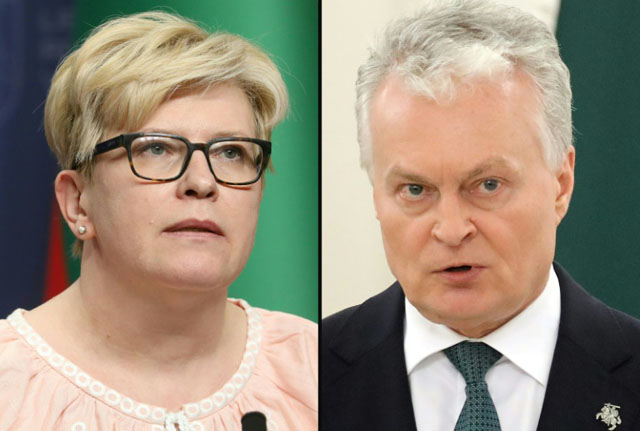News Flash
News Flash

VILNIUS, May 26, 2024 (BSS/AFP) - Lithuania's heads of state and government face off on Sunday in round two of the presidential election, as the Baltic nation prioritises defence and security amid fears over neighbouring Russia.
Both candidates agree that the NATO and EU member of 2.8 million should boost defence spending to counter the perceived threat, and to that end the government recently proposed a tax increase.
Former banker and incumbent Gitanas Nauseda, 60, is the heavy favourite to win another five-year term, saying he expects to receive 75 percent of votes.
There have been no opinion surveys since the first round, when Nauseda received 44 percent of the ballot while Prime Minister Ingrida Simonyte got 20 percent.
Simonyte, the 49-year-old candidate of the ruling conservatives, is running for president again after losing to Nauseda in the last presidential runoff.
The Lithuanian president steers defence and foreign policy, attending EU and NATO summits, but must consult with the government and parliament on appointing the most senior officials.
While the candidates agree on defence, they share diverging views on Lithuania's relations with China, which have been strained for years over Taiwan.
- 'Threat of war' -
Early voter Arturas Samoilenko said Simonyte had his support, arguing: "She is the better of the two."
"She would be more supportive of human rights," the 34-year-old marketing specialist told AFP.
Pensioner Ausra Vysniauskiene for her part opted for Nauseda.
"He's an intelligent man, he speaks many languages, he's educated, he's a banker," the 67-year-old told AFP.
"I want men to lead, especially when the threat of war is so big."
Lithuania is a significant donor to Ukraine, which has been battling Russia since the 2022 invasion, and is already a big defence spender, with a military budget equal to 2.75 percent of GDP.
This week, Simonyte's government came forward with proposals that could help raise defence spending to 3 percent.
Lithuania intends to use the funds to purchase tanks and additional air defence systems, and to host a German brigade, as Berlin plans to complete the stationing of around 5,000 troops by 2027.
Lithuania fears it could be next in Russia's crosshairs if Moscow were to win its war against Ukraine.
According to the Germany-based Kiel Institute, Lithuania ranks among the top three countries globally in terms of the GDP percentage spent on aid for Ukraine, at 1.22 percent.
- Tension over Taiwan -
The uneasy relationship between Nauseda and Simonyte's ruling conservatives has at times triggered foreign policy debates, most notably on Lithuania's relations with China.
Bilateral ties turned tense in 2021, when Vilnius allowed Taiwan to open a de facto embassy under the island's name.
The move was a departure from the common diplomatic practice of using the name of the capital Taipei to avoid angering Beijing.
China, which considers Taiwan a part of its territory and bristles at support for the island that might lend it any sense of international legitimacy, downgraded diplomatic relations with Vilnius and blocked its exports.
This sparked controversy among Lithuanian politicians, with some urging a restoration of relations for the sake of the economy.
Nauseda sees the need to change the name of the representative office, while Simonyte pushes back against it.
- Gay rights -
But for voters, personal differences between the candidates, as well as economic policy and human rights, seem to matter more.
Simonyte is known for her sense of humour and for writing her own social media posts.
She draws support from liberal voters in bigger cities and traditional conservative voters.
She is a fiscal conservative with liberal views on social issues and notably supports same-sex partnerships, which still stir controversy in the predominantly Catholic country.
"I would like to see faster progress, more openness... more tolerance for people who are different from us," Simonyte said when casting an early vote.
Nauseda, who maintains a moderate and measured stance on nearly all issues, has established himself as a promoter of the welfare state, with conservative views on gay rights.
"The past five years have shown that I have tried to achieve the goals I set," he said while casting an early vote.
Polling stations close at 1700 GMT, with no exit polls expected.